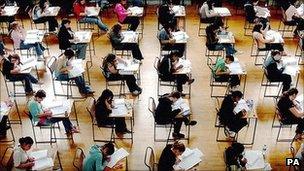GCSE English regrade 'damaging', Welsh government warned
- Published

Nearly 2,400 pupils in Wales had better results after the GCSE English language regrade
The Welsh government was warned its decision to regrade English GCSEs for pupils in Wales risked "damaging" the qualification's integrity.
Nearly 2,400 pupils in Wales who sat the English language exam with the WJEC received better results after a review.
The education minister said pupils were the victims of an "injustice" after receiving lower grades than expected following a shift in grade boundaries.
It marked a break with England where ministers refused to intervene.
Leighton Andrews said he did not take the decision order a regrade lightly.
Exam boards in England, Wales and Northern Ireland had been told over the summer by regulators to raise the threshold for awarding C grades meaning thousands of pupils were given lower than expected grades.
Following an outcry, Mr Andrews decided to regrade the results of Welsh pupils who sat the WJEC exam board English paper.
But BBC Wales has learnt the chief executive of the board warned Mr Andrews against taking such action.
BBC Wales education correspondent Nicola Smith spoke to Radio Wales' Felicity Evans about why the regrade was ordered
It came during the intense negotiations in early September over how and whether the grades should be regraded.
Within a week, however, the education minister - who is the exam regulator in Wales - ordered that grade boundaries for pupils be revised, meaning that 2,386 pupils in Wales had results increased.
The Cardiff-based exam board initially refused to implement the regrading and the minister was eventually forced to use his legal powers to issue a direction ordering them to carry it out.
In an email to a senior government official, WJEC chief executive Gareth Pierce said Wales-only regrading would create a "split standard" for its exams taken in Wales compared with those sat in England.
He added that it would "seriously damage the integrity of the qualification" and could lead to legal challenges against the WJEC from centres in England, which would put the exam board in an "untenable position".
Appearing in front of an assembly committee on Thursday, Mr Andrews said a report by his regulatory officials concluded "that there was no reason why performance should have been significantly worse in 2012".
"On that basis we concluded that the results were unfair to candidates," he told AMs.
"In Wales, we have acted to put right an unfairness. In England, a court case is pending.
"I believe that, in a situation that is by no means perfect, the Welsh regulatory system has delivered fairness for Welsh students."
He added the "the jury is out" on the future of the three-country system.
The minister has said in the past that the full implications of the changes he agreed over the summer only became clear when the results were published, and that the review was necessary in the interest of fairness to Welsh pupils.
Other documents, also released under the Freedom of Information Act, external, include minutes of a meeting of the awarding committee of the WJEC held after the regrading was ordered in September.
They make clear the deep disquiet of the members about the move.
They express serious concerns about the implications of the decision for future awards and that the committee was being put in a position that was "essentially untenable" in having to recommend that a student in Wales would get a different grade to a student in England despite achieving an identical mark.
Mr Andrews had accused UK Education Secretary Michael Gove of putting undue pressure on exam boards to make exams tougher.
Mr Gove denied the claim and refused to order a regrading of GCSE English language exam papers for pupils in England, including those who sat the WJEC paper
In Northern Ireland, a review of English GCSE grading has been ordered.
- Published13 February 2013
- Published5 October 2012
- Published25 September 2012
- Published24 September 2012
- Published18 September 2012
- Published11 September 2012
- Published25 August 2012